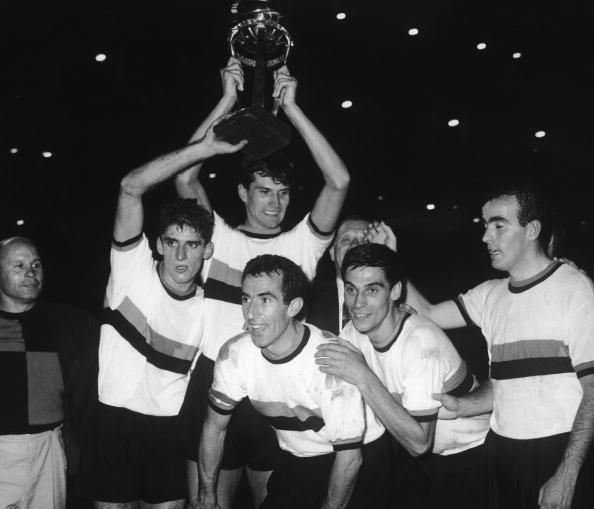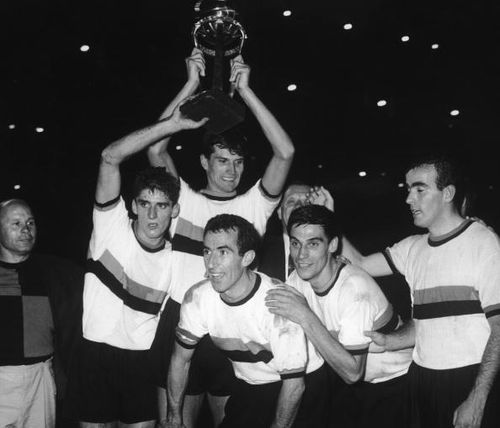
Armando Picchi: The first Libero
Karl Rappan, the manager of the Swiss National team in the 1930′s & 40′s, once had a dream. In the widely used W-M formation of those days, the opposition center forward got past his team’s central defender and hence had the goal to his mercy. This dream provided food for thought to the Austrian tactician and with the World Cup knocking on the door, a solution had to be devised. This eventually led to the invention of the verrou (translating to Door-bolt in French). In this system, Rappan deployed a defensive sweeper between the goalkeeper and the line of defense. The role of the verrouilleur was to clear any forthcoming danger that went past the line of defense in front of him. This tactical switch was later attributed to as the inception of the ‘libero’ in football, a position which was one of the most important in the 20th century.
The idea of the Verrou travelled places and it reached the Italian peninsula in the 40′s. Nereo Rocco pioneered the system with Triestina and led them to a surprising third place finish in the Serie A. In the 50′s, it was Rocco again who made optimum use of the system, now termed as Catenaccio, with Padova, by getting the collective best out of the seemingly limited resources at his disposal. But it was Helenio Herrera, during his time at Inter, who brought Catenaccio to the map of world football – back to back European Cup triumphs made Herrera’s brainchild the talk of the town.

Armando Picchi, captain of the Internazionale or Inter football team, celebrates his team’s win in the World Club Championship at the Santiago Bernabeu Stadium in Madrid, 26th September 1964.
One of the lynchpins of Herrera’s La Grande Inter (The Great Inter) was Armando Picchi – possibly the first recognized libero world football saw, and probably one of the most under-rated players of one of the greatest teams of the 60′s. The Livorno-born defender represented a stark contrast to the ‘La Bella Figura’ (The beautiful figure) impression that Italian defenders have made on the minds of football purists down the years, be it Gaetano Scriea, Franco Baresi, Alessandro Nesta or even Picchi’s own team-mate, the first truly modern full-back – Giancinto Facchetti, with their silk touches and abilities to play the ball out of defense. The first Il Grande Capitano was an unusual libero in a side which was built on the pillars of defense – which served as a platform for the Mazzola’s and the Mario Corso’s to shine in the final third of the pitch.
Armando Picchi was born in the small town of Livorno in 1935. He joined the local club – A.S Livorno Calcio – as a 14-year-old. The footballing brains of the club were so impressed by Picchi that he made his professional debut at the tender age of 19. Slowly, but gradually he cemented his place as a right back and later at the heart of defense. One of Picchi’s coaches recalls his experiences with the uncompromising defender -
“For Armando, every game was like a battle. He played his heart out every time he stepped out onto the pitch.”
His unerring consistency brought him to the notice of a number of clubs around the country and Real SPAL (currently plying their trade in Serie D), a reckoning force back then, won the scramble for his signature. His signing proved to be a masterstroke as the club secured their highest ever finish – finishing 5th in Serie A that season. Armando Picchi was slowly writing his own destiny.
The summer of 1960 proved to be the point where Picchi’s career took off in full flight. Newly appointed manager Helenio Herrera made him one of the priorities to shore up the backline. The directors did not waste much time and successfully negotiated the transfer with both player and club. Initially, Picchi was played at rightback with Tarcisio Burgnich occupying the central defence alongside Guameri. The move did not pan out well as both Inter and Picchi had a disappointing campaign. In the following season, he was moved into the heart of the Nerazzuri’s backline and Burgnich was deployed as the right sided defender, a position which was initially occupied by Picchi himself. Thus came about the formation which would be the trendsetter to many of Calcio and other foreign teams down the years.

With the departure of Bruno Bolchi, Picchi was given the armband – the way he set an example for the rest of the team and gave his all every time he stepped foot onto the field made him the primary candidate to replace the outgoing captain. Kenneth Wolstenholme, in the Pros, describes the importance of Picchi to the success of La Grande Inter. He writes -
“If a player got beyond the line of four backs, either by dribbling his way there or by creating space with one-two passing movement with a colleague, he would be confronted by Picchi. Any player who ran through to pick up a long pass would be confronted by … Picchi. Any high lob or centre which was floated into the Inter Milan goalmouth would be picked off by … Picchi.”
Indeed, this seemed to be the case on occasions such as in the 62-63 season, when a Picchi-led Inter held Everton to a goalless draw at the hostile Goodison. Another of Picchi’s finest performances in the black and blue of Inter came in the 1964 European Cup final against the mighty Real Madrid, who had the evergreen talents of Alfredo Di Stefano and Ferenc Puskas at their disposal. Though the Inter rearguard managed to keep the Galacticos at bay for a major part of the encounter, Picchi was always on hand to clear any impending threat that got past the line of defenders in front of him.
The 1967 European Cup final witnessed probably the biggest clash of ideologies. On one hand were Inter, who were built on a fortress of defense, and on the other hand were Celtic, who, under Jock Stein’s guidance, had matured into one of Europe’s most free flowing teams. Not many gave the team from Glasgow much of a chance. Inter were overwhelming favourites to lift the cup for a third time. What panned out during the course of the 90 minutes shook the foundation of world football. Celtic’s attackers ran riot in an exhilarating display of scintillating attacking play to gun down Herrera’s men and lift the European Cup. Celtic’s full-backs and wingers attacked the wings, portraying the fallibility of the system in cases when the game was stretched to the wings. Picchi’s brave-hearted performance wasn’t enough as Celtic deservedly won the encounter by 2 goals to 1. The empire called La Grande Inter was reduced to ashes. The media described Celtic’s achievement as a victory of the game -
“It was inevitable. Sooner or later the Inter of Herrera, the Inter of Catenaccio, of negative football, of marginal victories, had to pay for their refusal to play entertaining football.”
This defeat marked the end of a glorious era in the career of Armando Picchi. He was subsequently shipped off to Varese, where he continued to play for another couple of seasons before hanging up his boots at the age of 34. Thus came to an end, a glorious trophy laden career of the first Il Grande Capitano of the Nerazzuri. Post retirement, Picchi tried his hand at management with various clubs, most notably with Juventus. But by that time, the effect of Il Caffe Herrera (Herrera’s coffee) had caught up with Picchi. The use of performance enhancing drugs put by Herrera in the daily coffee of the players had adverse effects on them in the long run. Picchi was the first victim, his body succumbing to cancer at the early age of 36. Calcio had lost a legend, if there ever was one.

Stade Armando Picchi.
During his career, Armando Picchi stood out as the defining role of an ideal Libero. Recent tactical revolutions have seen central defenders split into two categories – elegant ball-players (Baresi, Nesta, Cannavaro) and hardened ‘blood and thunder‘ stoppers. Picchi, quintessentially, was a mix of both the categories, the first real sweeper-stopper. Well aware of his limitations, Picchi never ventured forward because the genius of Sandro Mazzola, Luis Suarez and Mario Corso necessitated a solid bedrock of defense – which was in turn, provided by him.
An ever burning desire to reach the pinnacle, coupled with a work ethic second to none, made Picchi the flag-bearer for Helenio Herrera, and one of the faces of La Grande Inter.